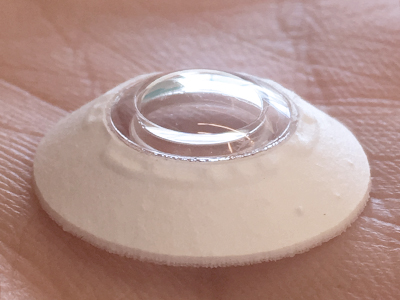
The fully synthetic cornea is less likely to be rejected, making it a much-needed alternative that requires no donor tissue.
In the first study of its kind, a global team of researchers are investigating the safety and effectiveness of the CorNeat KPro synthetic cornea in people with corneal blindness. The fully artificial cornea could be a game-changer for patients with corneal blindness, replacing the need for human donations and providing a much-needed alternative for patients who did not respond to current technology.
Vancouver Coastal Health Research Institute researcher Dr. Alfonso Iovieno is the lead of the British Columbia arm of the study, and brings to the table years of experience in research and clinical care to improve treatments for corneal disease.
“When a person who has been blind for a decade or more regains their sight, you witness a transformation in their whole persona,” says Iovieno.
“It is like they come back to life. They regain their enthusiasm. They can read again. They can talk to more people again. It is life-changing.”
The fourth most common cause of vision loss across the world, corneal blindness happens when disease or trauma renders the outer transparent layer of the eye opaque. Around 500 British Columbians are waiting for cornea replacement surgery at any given time, some anywhere from six months to one year.
Globally, corneal opacity — or varying degrees of corneal blindness — affects around 4.2 million people, according to the World Health Organization. Yet, a 2016 study found that over half of the global population had no access to replacement surgery; and, for every one cornea available, 70 were needed.

CorNeat corneas integrate more completely into the eye
Restoring the sight of a person with corneal blindness requires either a human donor cornea or a plastic polymer prosthetic cornea, aka, keratoprosthesis. Current keratoprosthesis often involves a skirt of human donor tissue around the edges of the synthetic cornea to secure it to the patient’s eye.
“While a fully human donor cornea could encounter graft rejection, standard keratoprosthesis with a human cornea component carries the risk of degradation and infection of the biologic part,” says Iovieno.
Cornea replacements can last between 10 to 20 years or more. However, the more replacement surgeries a person has, the greater the likelihood of a rejection, Iovieno explains. As global populations age, the demand for corneal replacements will likely continue to grow.
“In general, patients who have had three or more corneal transplants will have around a 100 per cent chance of rejecting another corneal transplant.”
The CorNeat KPro is a different type of keratoprosthesis. The entirely artificial cornea uses an electrospun nanofibre skirt to attach to the sclera, or the white of the eye, in a complex surgical procedure that takes around one hour to complete.

The fact that the CorNeat cornea is fully synthetic reduces the chances of it not integrating with the patient’s eye, says Iovieno. In contrast to other corneal prostheses, the CorNeat KPro gradually integrates with the eye’s fibroblast and collagen connective tissue cells.
“The white of the eye can grow into the spongy material of the CorNeat prosthesis, similar to a synthetic bone mesh,” he explains. “That is where the attachment happens, as opposed to at the edges of the cornea with donor tissue.”
Watch a news report of the first patient to receive a CorNeat KPro cornea:
While researchers are still investigating its safety and long-term effectiveness, Iovieno says there is a great deal of optimism that the CorNeat KPro could provide a valuable alternative for many patients at risk of rejecting donor tissues. Its 100 per cent manufactured materials could also help meet the high-demand for corneal replacements worldwide.
“If, in the future, CorNeat is seen as a safe substitute to a human cornea, it could cut down on wait times for this sight-saving treatment.”
Visit the clinical trial page to learn more about participating in Iovieno’s study.


